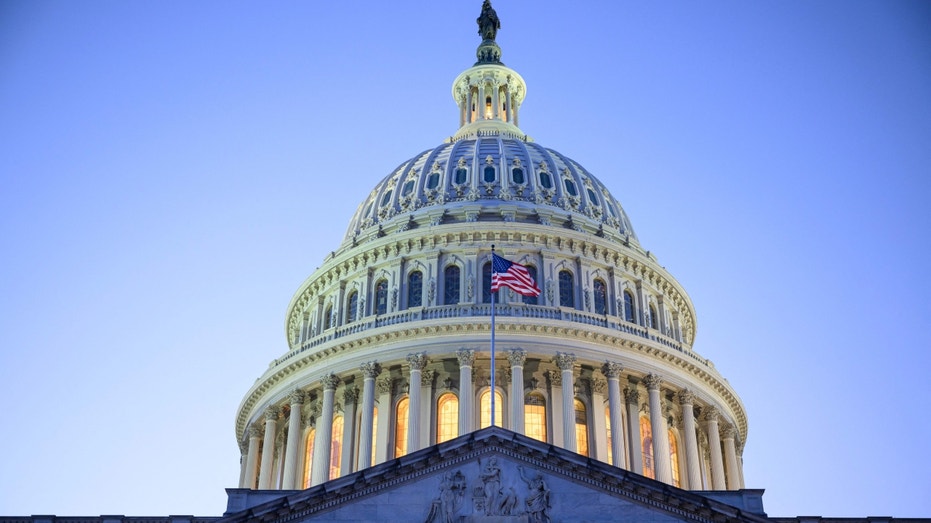Credit rating agency warns of congressional debt limit stalemate despite GOP majority
Fitch wrote that while it expects Congress to handle the debt limit, government funding and tax reform, challenges are likely
Lets use the debt limit as a negotiating tool, Sen. Ron Johnson says
Sen. Ron Johnson, R-Wis., discusses the looming government shutdown as Congress grapples with securing a spending bill.
The U.S. is at risk of hitting an impasse over the debt limit with congressional Republicans dealing with a threadbare majority in the House of Representatives, the Fitch Ratings agency warned in a report on Tuesday.
"The U.S. faces significant policy challenges in 2025 relating to the debt limit, appropriations, and tax cuts in the context of already large deficits and an increasing debt burden," Fitch wrote. "We think it is unlikely that debate to increase or suspend the debt limit will be resolved early in 2025 given the significant disagreements on spending policies in Congress.
"A pre-Christmas government shutdown was only averted at the last minute, after a contentious debate around President-elect Donald Trump's insistence that funding be tied to a fresh suspension/increase of the debt limit, and disagreements over certain spending items," Fitch explained.
Congress most recently raised the debt limit in 2023, when the Fiscal Responsibility Act suspended the debt limit through Jan. 1, 2025, and imposed spending caps on discretionary spending. It will likely have to act on a new increase or suspension of the debt limit this spring or summer to prevent the federal government from defaulting on its debt.
US NATIONAL DEBT HITS A NEW RECORD: $36 TRILLION

Fitch projected that Congress will need to act on the debt limit by July or August to prevent the federal government from defaulting on its debt. (MANDEL NGAN/AFP via Getty Images / Getty Images)
Earlier this month, the Treasury Department estimated that the new debt limit will become binding between Jan. 14-23 — which will prompt the agency to use accounting maneuvers known as "extraordinary measures" to avoid a default and fund federal obligations for a period of several months until those tools are exhausted.
It's unclear precisely how long those extraordinary measures will last, but Fitch analysts wrote that they believe the "x-date" could fall as late as July or August, giving lawmakers several months to deal with the debt limit.
FEDERAL DEFICIT NEARS $2 TRILLION AND GETTING WORSE, EXPERTS WARN
Aside from the debt limit, Congress will need to pass a government funding bill by March 14 to prevent a partial shutdown from occurring by enacting either a short-term continuing resolution or appropriations bills.
That debate may include discussion of extending the discretionary spending caps that expire in September, and could occur against the backdrop of negotiations on the extension of the 2017 tax cuts and related reforms Republicans plan to pursue through the budget reconciliation process.
PENN WHARTON MODEL SHOWS WAYS TRUMP ADMIN COULD LOWER DEBT WHILE SUSTAINING ECONOMIC GROWTH
The reconciliation process allows tax and spending-related legislation to bypass the Senate's 60-vote legislative filibuster and pass with a simple majority vote as long as the bill complies with special budget rules. Even with that option available, it will be a challenge for GOP leadership to guide legislation through that process with a thin House majority.
House Republicans won 220 seats in the November election, which gave them a five-seat majority over Democrats. However, those ranks have been thinned following the resignation of former Rep. Matt Gaetz, while two other GOP lawmakers have accepted roles in the incoming Trump White House.
The departures of those lawmakers will result in their seats being temporarily vacant until special elections are held for their successors — leaving Republicans with just a two-seat majority in the interim period.

House Speaker Mike Johnson, R-La., will have to deal with a thin GOP majority as Congress confronts a variety of fiscal policy issues. (Eva Marie Uzcategui/Bloomberg via Getty Images / Getty Images)
GET FOX BUSINESS ON THE GO BY CLICKING HERE
Fitch wrote that those dynamics could lead to "a busy period over the summer in which policymakers try to finalize appropriations bills, raise or suspend the debt limit before the x-date, and reach agreement on extending the 2017 tax cuts."
"Our base-case assumptions are that these issues will be resolved. But the absence of a unifying budget process and the forthcoming policy debate around additional tax cuts and spending adjustments amid a still-challenging political backdrop means that important decisions are likely to be reached on an ad hoc, issue-by-issue basis, underscoring the U.S.'s deterioration in governance on fiscal matters over recent years," Fitch explained.




















